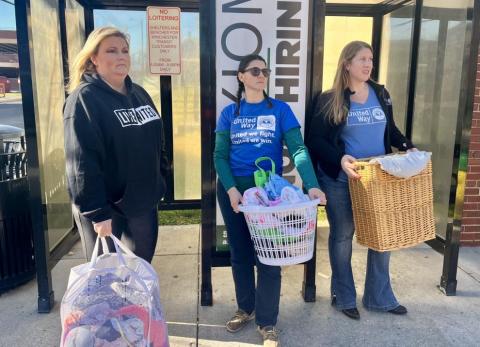'Walk a mile in someone else's shoes'
By BRIAN BREHM / Reporter, The Winchester Star
WINCHESTER — People who have enough money to cover all of their needs sometimes forget what it’s like to go without, so the United Way of Northern Shenandoah Valley (NSV) wants to remind them next week with its fifth annual ALICE Awareness Week.
“It’s a time for us to raise awareness about the challenges and struggles many members of our community face living paycheck to paycheck,” said Jennifer Hall, senior director of community investment for the United Way NSV.
ALICE is an acronym for Asset Limited, Income Constrained, Employed — the United Way NSV’s preferred way to refer to people who used to be known as the working poor. An ALICE individual earns just enough money to pay the bills but not enough to build up savings. He or she also earns just a bit too much to qualify for government assistance, leaving him or her with no monetary cushion to deal with unforeseen situations like job loss, illness or car breakdowns.
Starting Monday and continuing through Dec. 3, area residents are invited to participate in ALICE Awareness Week by volunteering for one of six challenges designed to help them better understand the stress and desperation of people who are just one paycheck away from becoming homeless, losing their means of transportation, having the lights and water shut off or worse. The challenges are:
Sleep on a couch or air mattress instead of a bed to understand what it’s like to be homeless or have inadequate housing.
Keep the lights off to identify with someone who can’t afford to pay the monthly electric bill.
Turn off the cell phone to see what it’s like to be without a primary tool for communication and internet access.
Spend a maximum of $5 per day on food for each person in a household because that’s all many ALICE individuals can afford.
Don’t use a car. Instead, rely on public transportation, walk or catch rides with friends, which many ALICE individuals have to do every day.
Wash and dry all of your laundry at a laundromat to get an idea of the expense and inconvenience faced by someone who can’t afford to buy a washer or dryer, or who lives in a home without the hookups needed for the machines.
“We don’t have a formalized sign-up [to participate in the challenges],” said Jenna DeHaven, director of advancement for United Way NSV. “It’s more of an honor system.”
“We want to challenge people to see what so many in our community are going through,” added Hall, who has previously participated in the laundry and transportation challenges.
Kaycee Childress, president and CEO of United Way NSV, said the majority of Northern Shenandoah Valley residents — as many as 60% of them — qualify as ALICE individuals. That’s about 10% more than just a year ago, a change attributed to inflation, high gas prices and missed workdays due to the COVID-19 pandemic.
“I read an article on LinkedIn about a month ago that said the average family of four is now spending $450 a month more than they were spending six months ago,” Childress said. “All of a sudden, people who were getting by are not anymore.”
Childress said she, her husband and their five children will participate in the $5-a-day food challenge next week but, as of Wednesday, she had no idea how to pull it off.
Many people with limited grocery budgets rely on food banks to have enough to eat, but Childress said she won’t do that because that would literally take food out of the mouths of people in need. Instead, she’ll supplement the groceries she can afford on her restricted budget with a box of canned food items that have been stored in her basement.
Childress, Hall and DeHaven said they’ll share stories from their ALICE challenges next week on social media, and they encourage other participants to do the same.
“We’re asking people to use social media to talk about what it feels like to do these things,” DeHaven said. “How much of a pain in the neck is it? How stressful is it? What’s the carryover into other parts of your life?”
“Walk a mile in someone else’s shoes,” Childress said. “These are really good, honest, hard-working people, some of whom are holding down two or three jobs just to try to make ends meet. They are your neighbors, your friends, your child’s classmate.”
In addition to the six ALICE challenges, area residents are encouraged to donate money to the United Way NSV’s ALICE emergency fund, which provides one-time assistance to people facing a financial crisis.
“We’re doing the 20 for 40 Challenge,” Childress said. “Basically, we’re trying to raise $20,000 so we can help 40 families with the ALICE emergency fund.”
The fund provides up to $500 per person to help with emergencies. Childress said previous disbursements have kept people from losing their homes, losing their jobs and losing their cars, allowing them to remain in the workforce and support their families.
“We’ve been able to assist 45 families with it so far,” Hall said, noting that a total of $21,130 in donated funds have been awarded to people who needed help with rent payments, transportation, medical bills, education expenses and so on since the ALICE emergency fund was established in 2018.
To learn more about the United Way NSV’s ALICE Awareness Week challenges or to make a contribution to the nonprofit’s ALICE emergency fund, visit unitedwaynsv.org/aliceawareness.
United Way of Northern Shenandoah Valley President and CEO Kaycee Childress (from left), Director of Advancement Jenna DeHaven and Senior Director of Community Investment Jennifer Hall stand at a North Cameron Street bus stop on Wednesday to demonstrate a common occurrence for ALICE individuals: Using public transportation to take their family’s dirty clothes to a laundromat.
Source: 'Walk a mile in someone else's shoes' | Winchester Star | winchesterstar.com

